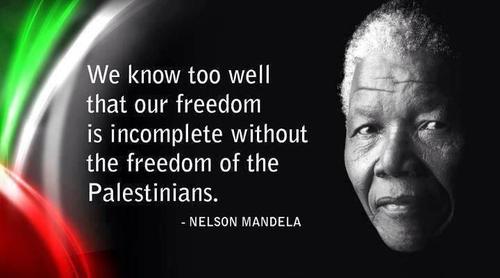
By: Shahab Moghadam
Note: The below content is the opinion of the author alone and should therefore not in any way, shape, or form be construed as the opinion of The Political Student’s editorial staff.
The late and great Nelson Mandela told the people of the world that what is right is not always convenient, and he put actions behind his visionary and inspiring words through his relentless advocacy for the downtrodden and mistreated peoples of the world, be they controversial yet largely impoverished nations such as Cuba under the Castros or the Palestinians who have just as much a right to exist as the Israelis do yet are often treated as if they are terrorists because of the desperate measures they have had to resort to in attempting to free themselves from the heavy-handed treatment they have faced for over six decades at the hands of the Israelis, who have an inalienable right to live in their Promised Land under a sovereign Jewish state but have no right to deny similar rights and liberties to their neighbors in Gaza and the West Bank.
Netanyahu and his ilk, which do not speak for much of the center-left oriented Israeli population to begin with, have long claimed that misinterpreted Biblical phrases and ages-old prejudices somehow justify them to prevent the Palestinians from having a homeland of their own, but they are wrong and just as they know it, so does much of the world. It is past time that the American government, which has under both parties unquestioningly blocked Palestinian statehood even when much of the world including our allies in Europe did the opposite, face the facts and recognize that Israelis and Palestinians can and should live side by side in the land which both of them call their Holy Land and which became holy not because of the swords of war but because of the preachings of peace.
Furthermore, the United States should also come to terms with the realization that Iran is not an evil pariah state seeking to wreak havoc throughout the Middle East to achieve the destruction of Israel and the success of its radical agenda, but is rather a regional player whether we like it or not with considerable support among not only nations and peoples in the region but also world powers such as Russia and China. To dismiss the prospects of diplomacy and possible peace with a regional power which could well help keep the peace in Afghanistan and promote resolution of conflict in places like Syria which are currently suffering from brutal sectarian conflict and where both parties are not completely guiltless would be unwise at best and a dreadful mistake at worst, especially as the United States seeks to turn its focus away from Middle Eastern conflicts towards the simmering tensions in the economic powerhouses of the Far East.
Until we as a nation realize the errors we have made in approaching some of the world’s most important conflicts and do a much-needed course correction, our international viability will continue to flag as dangers continue to grow at a time when poor decision-making by leaders belonging to both of the country’s main political parties has led even our closest allies in Europe and Latin America to rethink their relations with us.
